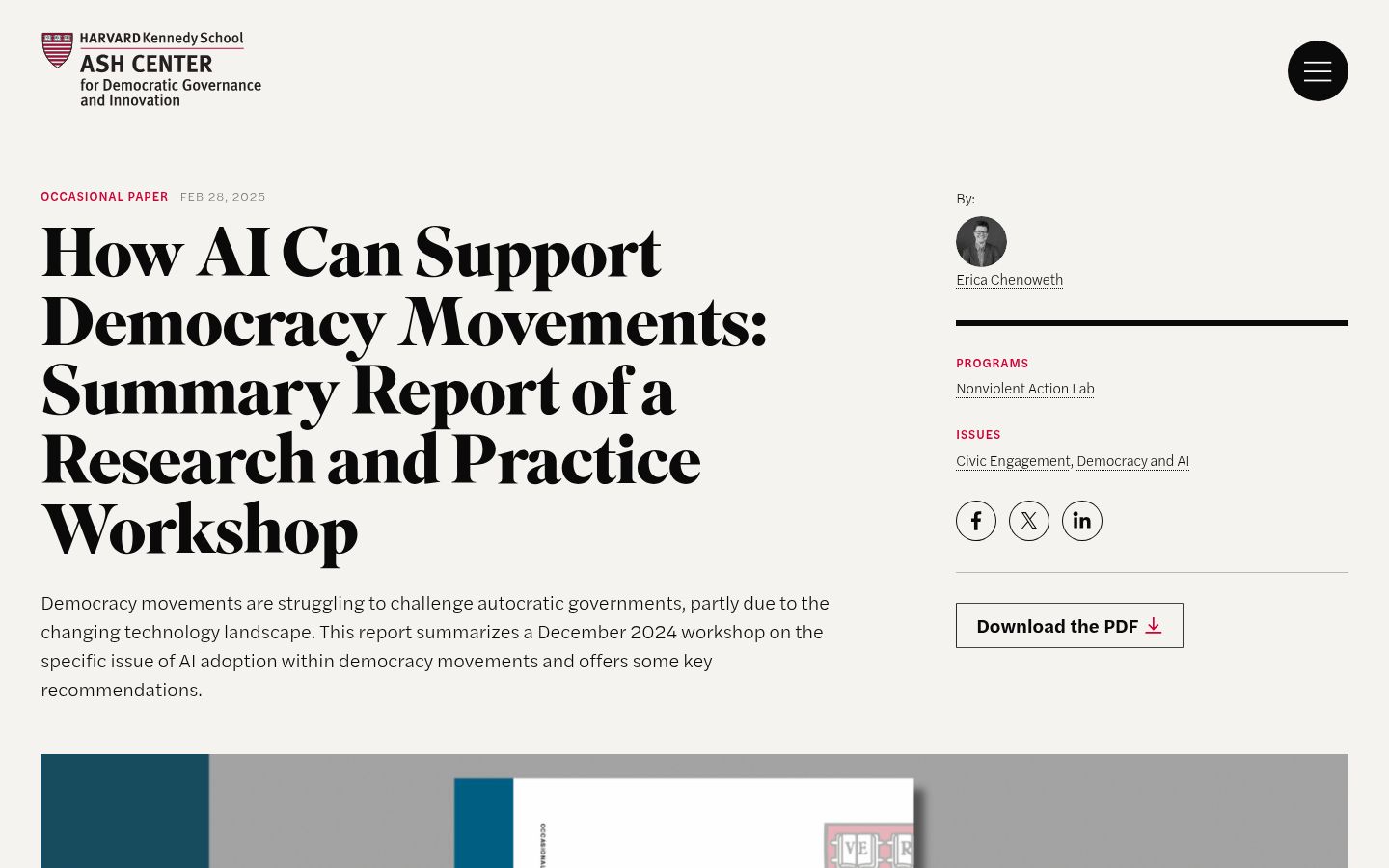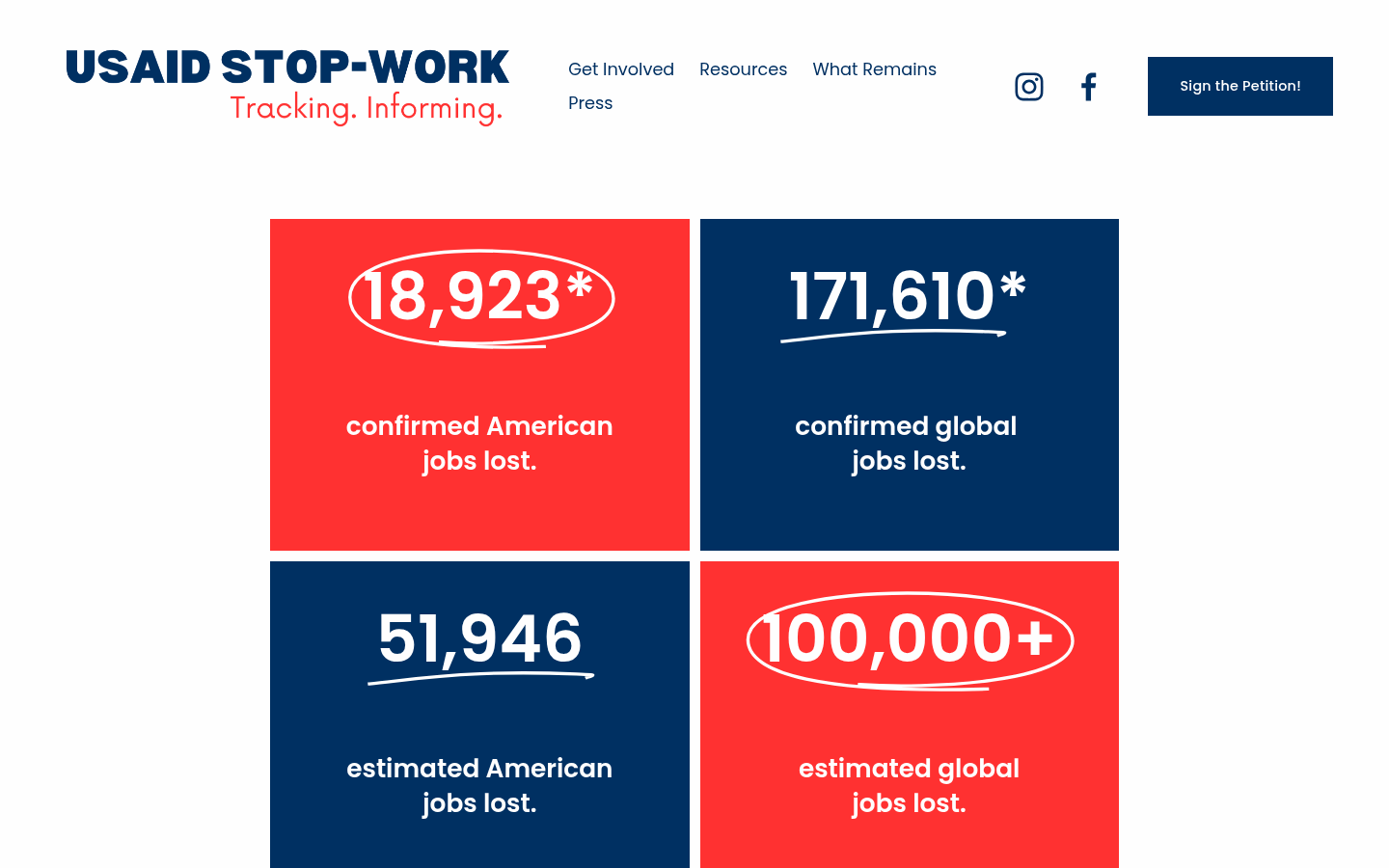Civic Tech Field Guide
Sharing knowledge and productively growing the fieldSearch Results - AI (4495)
Showing 4495 Results

Indigenous AI
GlobalThe Indigenous Protocol and Artificial Intelligence (A.I.) Working Group develops new conceptual and practical approaches to building the next generation of A.I. systems.

CEE. AI Lab
Central and Eastern EuropeGame-changing program for newsrooms with the tools and knowledge to harness AI for smarter, more efficient journalism.

How AI Can Support Democracy Movements: Summary Report of a Research and Practice Workshop
Harvard University, Cambridge, MA, USAThis report summarizes a December 2024 workshop on the specific issue of AI adoption within democracy movements and offers some key recommendations.

Using AI Now to Improve Movements’ Effectiveness: A Basic Introduction Guide for Social Activists
Harvard University, Cambridge, MA, USAFreddy Guevara offers a fundamental playbook for social activists on how to augment advocacy efforts with artificial intelligence technologies

No matter if your newsroom has an established AI policy or if you are just getting started, here are 5 key challenges to consider and 5 practical recommendations for establishing a trust-based AI policy based on insights from the publishers participating in the AI Collaborative and Fellowship

USAID Stop-Work
Cincinnati, OhioTracking. Informing.

USAID Impact Stories
United States of America (the)A public Google Drive folder with USAID photos, social media cards, interview transcripts, and reports

USAID Resource Hub
United States of America (the)A centralized resource hub/database designed to support nonprofit and development professionals, organizations, and advocates navigating the impacts of the USAID shutdown—and beyond.

Identifying Terminated USAID Programs
United States of America (the)This form is to help quickly identify what activities were terminated in the February 25 Armageddon at USAID.

Federal Workers Against DOGE
United States of America (the)Standing with federal workers against a corporate-backed coup led by DOGE.

Friends of USAID
United States of America (the)Organizing effort to fight for the life of USAID, including an instagram account with over 50,000 followers

Using publicly available satellite imagery and deep learning to understand economic well-being in Africa
Stanford University, Serra Mall, Stanford, CA, USAArticle in Nature by Christopher Yeh, Anthony Perez, Anne Driscoll, George Azzari, Zhongyi Tang, David Lobell, Stefano Ermon & Marshall Burke

Hedging for Sustainability: Twenty Revenue Streams for Democracy, Rights, and Governance Non-Governmental Organizations
Washington, DCNGOs in the democracy, rights, and governance space are facing unprecedented cuts to their funding. This blog explores new revenue streams to help them continue their critical work.

g0v Taipei Community Hub / NPO HUB 2nd Floor 202
Taipei City, TaiwanAn open and transparently-run community space for the g0v community in Taipei

USAID Forever Sweatshirt
United States of America (the)Benefits organizations supporting USAID’s global workforce that have lost their jobs including Democracy Forward, which fights in court for people and democracy.

These are the results of a survey measuring the impact on organizations across the world affected by the US Government aid freeze.

Using Collective Dialogues and AI to Find Common Ground Between Israeli and Palestinian Peacebuilders
United States of America (the)Human Computer Interaction article by Andrew Konya, Luke Thorburn, Wasim Almasri, Oded Adomi Leshem, Ariel D. Procaccia, Lisa Schirch, Michiel A. Bakker

The Situate AI Guidebook: Co-Designing a Toolkit to Support Multi-Stakeholder Early-stage Deliberations Around Public Sector AI Proposals
Carnegie Mellon UniversityBy Anna Kawakami, Amanda Coston, Haiyi Zhu, Hoda Heidari, Kenneth Holstein

Justicia Lab AI
New York, NYThe World's First Non-Profit AI Lab for Immigrant Justice

Participatory AI Research & Practice Symposium (PAIRS)
Paris, FranceThe first edition of PAIRS took place as an independent side-event of the Paris AI Action Summit (10th - 11th Feb 2025) providing a space to present research and case studies on the state of the art in participatory development and governance of AI, and to build stronger connections across the field.

Disaster Relief Assistance for Immigrants (DRAI)
San FranciscoCode for America effort. DRAI distributed emergency cash assistance to immigrants who were undocumented and had lost income or suffered health impacts from COVID-19.

Make It Fair campaign
LondonThe UK news industry is calling on the government to ensure creatives are rewarded properly so as to ensure a sustainable future for AI and the creative industries.

MuDG is a platform that aims to improve the quality of debates and discussions by recognizing the inherent structure of conversations as graphs, and using AI to augment and refine concepts, explore interesting directions, and foster productive collaboration through building shared knowledge

DataKind is hosting a virtual DataKit event, a work-ready set of data science problems in the domain of social good

The newsletter discusses the recent developments in digital transformation in government, including the emergence of DOGE in the US, the need for radical state reform, the launch of the UK's new digital centre for government, and the Paris AI Action Summit where AI was repositioned as a public asset

Pickle is an AI-powered digital double that can be used in video calls to create a consistent and polished appearance

Nusmark is an AI-powered WhatsApp secretary that helps users set reminders, complete tasks, and make bookings for events

The article discusses the challenges of building governable online communities, highlighting how many online groups and mutual aid projects have fallen apart due to internal conflicts

Chorus AI is a platform that helps non-profit organizations streamline their content creation, data analysis, and knowledge management processes

Typst is a new text composition tool that aims to provide a more productive workflow for writing and formatting documents, with features like instant previews, clear error messages, and powerful templates that automatically format content as you write

Fileverse is a decentralized, privacy-focused file sharing and collaboration platform that enables onchain communities and individuals to work together securely and transparently

The article discusses Renaissance Philanthropy, a new organization that aims to facilitate the funding of ambitious scientific and innovative projects by wealthy philanthropists, similar to how the Medicis supported the great artists and inventors of the Italian Renaissance

The AI Governance Map is an interactive visualization that provides an overview of the AI governance landscape, including key organizations, initiatives, and resources related to the responsible development and deployment of AI systems

This document outlines a protocol for a systematic review and meta-analysis of the relationship between public sector skills and productivity

The content discusses the need to redefine and shift the production of AI systems away from the hegemonic capitalist model towards more disruptive, inclusive, and decentralized models that challenge the dominant logic of an 'AI arms race'

Google DeepMind is exploring the use of AI to accelerate scientific discovery and innovation, with the goal of ushering in a new golden age of discovery

Amnesty International's Algorithmic Accountability Lab conducted a two-year investigation into the use of algorithms and AI by Denmark's welfare agency, Udbetaling Danmark (UDK), revealing troubling patterns of discriminatory practices that target vulnerable groups such as people with disabilities, marginalized racial groups, migrants, and refugees seeking benefits

In 2024, the Wikimedians for Sustainable Development user group marked its fifth year, advancing sustainability within the Wikimedia movement through active participation in meetings, events, and communications

This report investigates the impact of platform design on online violence against women and girls (VAWG)

Limehouse Labs is a small collaborative workshop located in Limehouse Town Hall, London, that provides a workspace and equipment for people working on hardware, software, craft, and arts projects

OpenAI is funding research at Duke University to develop algorithms that can predict human moral judgments in scenarios involving conflicts among morally relevant features in medicine, law, and business



